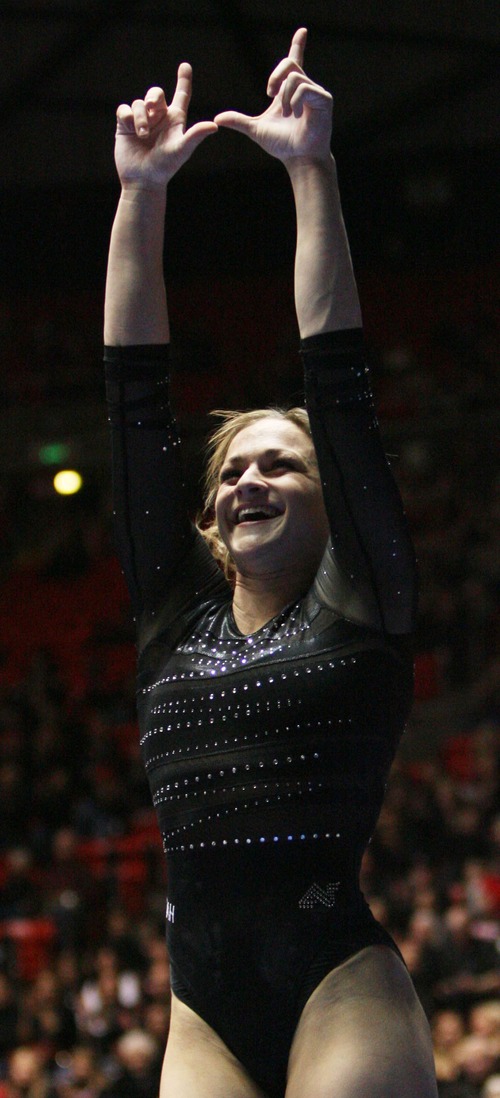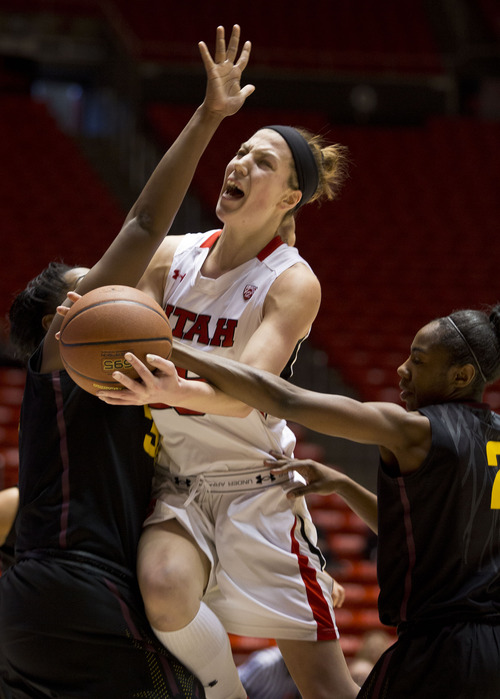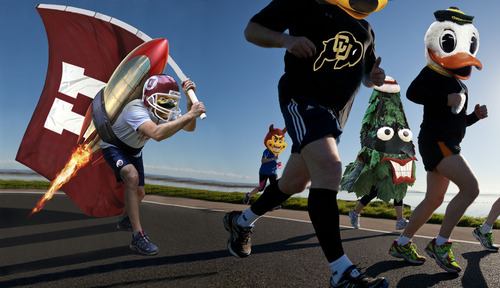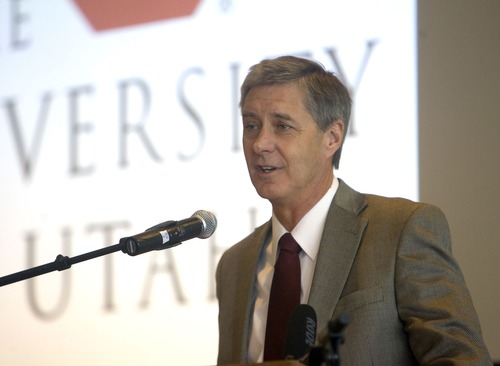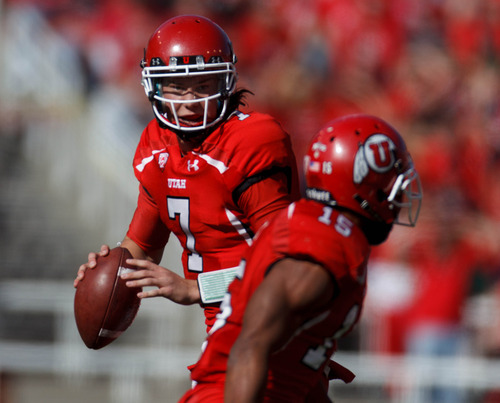This is an archived article that was published on sltrib.com in 2013, and information in the article may be outdated. It is provided only for personal research purposes and may not be reprinted.
Utah athletic director Chris Hill has his own version of that adage from "Field of Dreams." Build it and they will win — and soon.
With facility upgrades either in the works or planned for virtually every sport the school sponsors, totaling about $64.2 million in financial commitments, Utah's transition to the Pac-12 is moving to its next phase — from getting spendy to getting competitive.
Two years into the Pac-12, the Utes are still languishing behind the majority of their foes in conference races. The closest the Utes have come to claiming a league title was when the gymnastics team finished second in 2012.
For the most recent season, gymnastics led the way again with a third-place finish at the Pac-12 Championships and women's basketball had the second-best effort with a sixth-place finish in the regular-season standings.
The remaining teams were below .500 and finished near the bottom of the standings in the sports that keep official league standings.
While a few struggling seasons were to be expected as the Utes moved to a BCS conference, the impetus is on Utah's coaches to start producing results sooner rather than later.
"There is no question everyone is feeling more pressure to win now than we used to," Hill said. "Everybody knows our challenges when we moved to the Pac-12, and they are great challenges, but we aren't afraid of high expectations."
That said, what is realistic for the Utes? If longtime Pac-12 members such as Cal, Washington State and Washington have trouble competing against mighty programs like USC and Stanford, how long will it take for the Utes to get on a level playing field?
A sobering assessment
A.J. Maestas, president of Navigate Research, a sports marketing research firm, projects it could take almost 30 years for Utah to even the playing field in the Pac-12 — not only in competitive results, but also financially.
The Utes will receive a 75 percent share of Pac-12 monies for the 2013-14 year, which is projected to be about $15 million. While those funds are a significant increase from what the Utes received in the MWC, Utah still lags behind its league competitors.
"They aren't sitting on their laurels, but it's like they started the race half the distance behind everyone else," Maestas said. "They are at a massive disadvantage, and you can't catch up overnight."
Maestas believes the deficit affects "everything," from the financial books to recruiting to winning on the field.
Hill chuckles when he hears Maestas' long-term projections. It might take Utah decades to draw even in the financial books, but he expects Utah to be competitive on the field much, much sooner.
"We are realistic, but we are intending to be good in some sports and competitive in all in the next few years," he said. "We know it's going to be really hard, but it's a fun challenge. We knew that going in."
Football is a key
The expectations predictably focus mainly on football, where Utah has gone from being an annual contender for Mountain West Conference titles to being ineligible for a bowl in 2012.
Winning appears an even more challenging prospect in 2013 than it did in the first two years, with nationally ranked Oregon and Stanford replacing Cal and Washington on the Utes' schedule.
However, Utah coach Kyle Whittingham is optimistic his team can make headway in the standings.
Just as the Utes started behind the other Pac-12 members financially, Utah has had to play catch-up in recruiting.
This season should be the first when the Utes see some impact of their efforts as a Pac-12 school. The $32 million football facility that will open in July will help the efforts too, Whittingham said.
"As a program we have made a lot of progress with facilities, recruiting and everything we need to be competitive in the Pac-12," he said. "We have to keep building depth and talent, but we are getting there."
Every coach extols the virtues of fancy new buildings for recruiting purposes. But in the Utes' case, all the overhauls are critical in maintaining Utah's image as a growing program, even as it struggles with results, according to Michael Smith, a writer for SportsBusiness Journal who covers the league.
"That kind of new building has the ability to give the football program a face-lift and change perceptions about the Utes running a big-time football operation," he said. "Every football program these days needs an impressive space that serves as a front door to the program, and that's what Utah will have."
Patience still needed
Still, it could take several seasons more for other sports to start seeing positive results. The Utes' adjustment to the Pac-12 is challenging because the conference is strong in the so-called Olympic sports, with Stanford, UCLA and other schools regularly hauling in NCAA titles — helping the league live up to its billing as the "Conference of Champions."
The Pac-12 has won 400 NCAA championships, a number unsurpassed by any other conference.
"It is a big leap for a lot of our programs," Utah gymnastics coach Greg Marsden said. "The Pac-12 is among the best in many sports in the nation that sometimes it seems it's almost as easy to win a national championship as it is a Pac-12 title. It's a big change for a lot of teams."
There were some hints of success among the losses. The men's basketball team nearly upset No. 19 Oregon in the semifinals of the Pac-12 Tournament, and beat USC and Cal to win the program's first two postseason games in Pac-12 play. The women's basketball team finished second in the WNIT and the baseball team upset nationally ranked Oregon at the end of the season.
The volleyball team also notched its first win over Oregon State, and the softball team earned its first road win by beating the Beavers.
Such wins wouldn't get much attention if the Utes were still in the MWC, where they regularly won. But they are learning that winning anytime in the Pac-12 is an accomplishment worth celebrating.
Utah basketball coach Larry Krystkowiak said he believes those small milestones are an indication his program is turning things around and hopes his team can climb into the upper echelon of the league this season.
"That is the plan," he said. "We're in a nice conference, and a lot of the benefits of being in the Pac-12 make it difficult too. It's like the saying goes, the same thing that may make you laugh can make you cry, too. We have to be able to move up."
Despite the slow progress, Hill remains convinced his programs will succeed. He has more than $64 million in improvements riding on that belief.
"For us to get where we want to go and be successful, you have to have good athletes, coaches and facilities," he said. "It takes a while to get all that in place. But we are playing in the biggest of bigs and we know what is at stake — everybody knows. We are still keeping score, and we are going to try to win." —
Strugglin' in the Pac
Sport Place Pac-12 record Overall record
Baseball 12th 7-23 21-31
M. basketball 10th 7-14 15-18
W. basketball 6th 9-11 22-14
Football 5th* 3-6 5-7
Gymnastics 3rd 4-1-1 20-9-1
W. soccer 9th 3-7-1 8-8-3
Softball 9th 7-17 24-30
Volleyball 9th 5-15 14-19
*South Division


